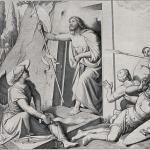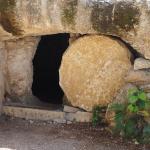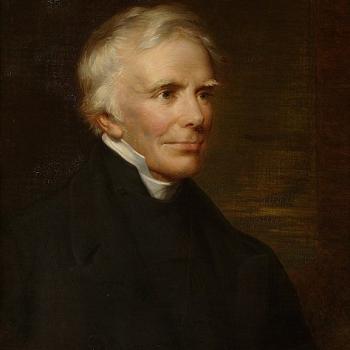This came from an exchange with an atheist in the combox of Jonathan MS Pearce’s article, “Why Matthew’s guards at Jesus’ tomb are so important” (1-27-22). The atheist’s words will be in blue.
*****
1. Jesus tells a disciple the content of what He prayed.*2. Said disciple includes it in his Gospel.
1. Jesus tells a disciple the content of what He talked about with the devil.*2. Said disciple includes it in his Gospel.
1. Jesus tells a disciple the content of what He prayed / talked about with the devil.*2. Said disciple spreads this information as part of oral tradition and/or possibly the mysterious source “Q”.*3. The information later becomes incorporated into one or more of the four Gospels.*
Luke 22:32 (RSV) “but I have prayed for you [Peter] that your faith may not fail; and when you have turned again, strengthen your brethren.”
John 17:7-9 Now they know that everything that thou hast given me is from thee; [8] for I have given them the words which thou gavest me, and they have received them and know in truth that I came from thee; and they have believed that thou didst send me. [9] I am praying for them; I am not praying for the world but for those whom thou hast given me, for they are thine;*
Luke 1:1-4 Inasmuch as many have undertaken to compile a narrative of the things which have been accomplished among us, [2] just as they were delivered to us by those who from the beginning were eyewitnesses and ministers of the word, [3] it seemed good to me also, having followed all things closely for some time past, to write an orderly account for you, most excellent The-oph’ilus, [4] that you may know the truth concerning the things of which you have been informed.
We regard the New Testament as a trustworthy document because it has been proven zillions of times by archaeology to be historically accurate in details. So we can trust it in places that don’t have express historical evidences in its favor.
It’s the same manner in which we trust the demonstrably credible, reliable witness in a court trial. There’s lots of other ancient literature that has supernatural or very odd elements that isn’t dismissed just because of that. Thus, this “standard” isn’t applied by atheists across the board.
We need to have a fair approach to ancient authors. We give them the benefit of the doubt that they are sincere and of good will, unless we have compelling evidence otherwise. Atheists offer no compelling reason or evidence for regarding the Gospel writers as deliberate deceivers or liars. For example, we might consider the Greek historian Herodotus. Wikipedia states about him:
Herodotus (c. 484 – c. 425 BC) was an ancient Greek writer, geographer, and historian . . . known for having written the Histories – a detailed account of the Greco-Persian Wars. Herodotus was the first writer to do systematic investigation of historical events. He is referred to as “The Father of History”, a title conferred on him by the ancient Roman orator Cicero.
The Histories primarily covers the lives of prominent kings and famous battles such as Marathon, Thermopylae, Artemisium, Salamis, Plataea, and Mycale. His work deviates from the main topics to provide cultural, ethnographical, geographical, and historiographical background that forms an essential part of the narrative and provides readers with a wellspring of additional information.
Herodotus has been criticized for his inclusion of “legends and fanciful accounts” in his work. Fellow historian Thucydides accused him of making up stories for entertainment. However, Herodotus explained that he reported what he “saw and [what was] told to him.” A sizable portion of the Histories has since been confirmed by modern historians and archaeologists.
Accordingly, we have an article in The Guardian: “Nile shipwreck discovery proves Herodotus right” (3-17-19).
Now, is his entire body of work discounted, and is he regarded as a wanton liar because he has some supernatural elements? No. What has been confirmed by archaeology and subsequent historiography is accepted, while atheists who don’t believe in the supernatural simply discount those sections.
Practical Matters: Perhaps some of my 3,900+ free online articles (the most comprehensive “one-stop” Catholic apologetics site) or fifty books have helped you (by God’s grace) to decide to become Catholic or to return to the Church, or better understand some doctrines and why we believe them.
Or you may believe my work is worthy to support for the purpose of apologetics and evangelism in general. If so, please seriously consider a much-needed financial contribution. I’m always in need of more funds: especially monthly support. “The laborer is worthy of his wages” (1 Tim 5:18, NKJV). 1 December 2021 was my 20th anniversary as a full-time Catholic apologist, and February 2022 marked the 25th anniversary of my blog.
PayPal donations are the easiest: just send to my email address: [email protected]. You’ll see the term “Catholic Used Book Service”, which is my old side-business. To learn about the different methods of contributing, including 100% tax deduction, etc., see my page: About Catholic Apologist Dave Armstrong / Donation Information. Thanks a million from the bottom of my heart!
***
Photo credit: Jesus Tempted, by Carl Bloch (1834-1890) [public domain / Wikimedia Commons]
***
Summary: An atheist brought up a point of puzzlement & curiosity to him: how is it that the Gospel writers can know of events, where no one else was present to witness them?
*














